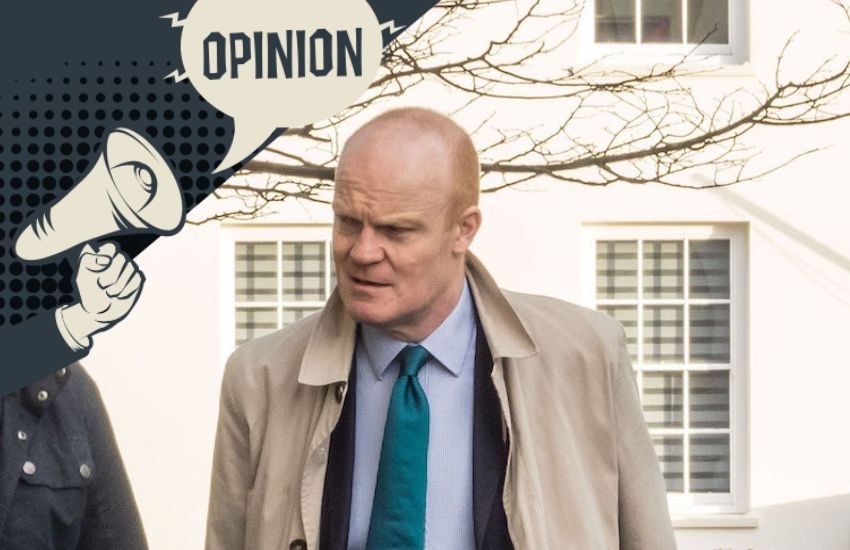


Deputy Gavin St Pier reflects on last week's short and sweet States debate:
A three day meeting done and dusted in a day, no doubt suited those States’ members who have little time for the work of the Assembly, especially as the sun was shining and the forecast for the remainder of the week was good.
It felt like Deputy Brouard was, at least in part, using his Committee’s half-yearly update statement as a dry-run for the arguments he will need in July’s capital debate, if he is to successfully save phase 2 of the hospital modernisation project from cancellation. And who can blame him? Whilst Policy & Resources have already lost the public’s hearts and minds in the capital spending debate, with the dependable majority they can normally rely upon in this Assembly, that does not mean they will lose the vote in July on their recommendations. Few in the community are convinced the money has really run out, having watched P&R magic £29m from the back of a sofa for a ship, in an ‘emergency’ that no-one understands, including significantly both Jersey and it seems Condor themselves. The logic of scrapping health facilities needed by all, whilst pursuing the building of a second Sixth Form Centre so close and so recently to the first, is also lost on most. Deputy Roffey’s statement on behalf of the Committee for Employment & Social Security drew attention to the need for more capital funding if the government is serious about addressing the housing shortage. Partly because some members don’t seem to much like the work of the Guernsey Housing Association, seeing it as crowding out the private sector rather than being complementary to it, and partly because some members don’t seem to much like Deputy Roffey, one can’t but help think that ESS may struggle on this one.
Deputy Gollop did an excellent job with his questions to Deputy Dudley-Owen of exposing the absurdity that the Committee for Education, Sport & Culture seems to be on the verge of cutting funding to the Sports Commission, in a showcase year for sports on an island hosting the Island Games.
Deputy Ferbrache did an excellent job too of fending off a raft of questions about the purchase of that ship. He was refreshingly brief and direct in confirming that government had leant on Condor to issue a ‘clarification’ to the original reported story that they had alternative funding available. However, the constant assertion that nothing much can be said because it’s all subject to the confidentiality of the Civil Contingencies Authority Law really doesn’t wash. Firstly, the CCA Law allows the CCA themselves to determine what they wish to release publicly. If they want to put it all out there and resolve so to do, then the legal confidentiality falls away. Secondly, even if there are sufficiently good reasons for an emergency to exist in Guernsey but not Jersey, that justify buying a ship that will service both islands without particular benefit having been secured for Guernsey, that does not mean that everything associated with the deal is subject to the CCA confidentiality. The CCA’s reasons for ordering that a deal be done may be confidential until they decide otherwise, but the deal itself was struck by P&R, and the terms of that have nothing to do with CCA confidentiality. Given there is only one ship, one operator and one lender, it is not obvious that another favourite, ‘commercial confidentiality,’ can be properly relied upon to prevent the public knowing how their money was used, in order to judge whether elected representatives have done a good deal.
Deputy Soulsby managed to not be supported by 11 members in a secret ballot with only one name on it, hers, to be re-elected as a governor of The Ladies’ College. One, or even two, would not be exceptional, but 11 is unprecedented. Some will tell you that toxic personality politics does not exist. You decide.
25 members did not want to debate Dr Rabey’s Responsible Officer Annual Report. In doing so, they were following Deputy Brouard’s entreaties on behalf of HSC not to support a debate. It defies common-sense to have opposed debate, the outcome of which could only have been ‘to note’ the report’s very existence. What on earth was there to be afraid of? It is sadly indicative of a systemic culture that seems to treat any question or scrutiny as some kind of personal sleight. Bizarre.
Introducing the concept of ‘adverse inference’ into the criminal justice system if defendants fail to do certain things in preparing their case, didn’t detain the States for very long. Neither did voting to shift the Royal Assent procedure for most legislation from London to Government House. Predictably, debating the States’ own internal Code of Conduct rules took rather longer, requiring an adjournment for the States’ Assembly & Constitution Committee to amend its own propositions. Members were concerned among other things that by introducing a Commissioner for Standards, members’ right to appeal was being lost. The solution: a vote to proceed with the rule change but to direct that it be looked at again by October. In the meantime, the President of SACC, Deputy Meerveld gave an undertaking that any appeals would be held over, which rather presumed the outcome of the review. Still, another debate on the issue might help fill another quiet States’ day later in the year, if needed.